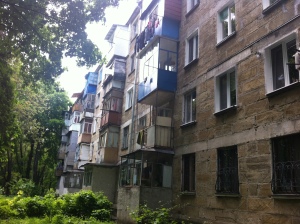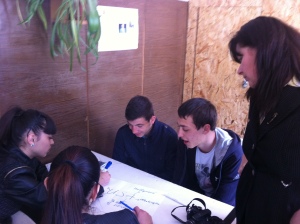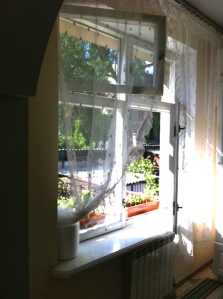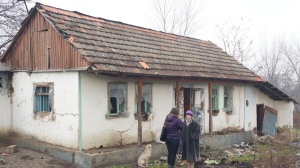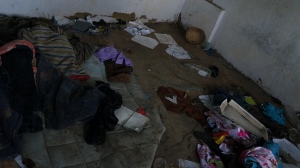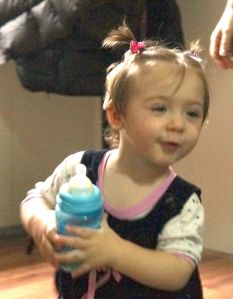
Sarah Gardner in Seattle on the IJM Freedom Ride
“ASE Asks” is a series in which NCC ASE interviews everyday individuals who are making a difference in the fight against slavery and exploitation in their own unique and creative ways. We love to show our readers that you don’t have to be a “professional” to seek justice and meet the needs of the broken. If you know someone who NCC ASE should feature on “ASE Asks,” contact us.
Sarah Gardner is the Event Coordinator for NCC ASE in addition to her full-time position as a Neonatal ICU Nurse at Virginia Hospital Center. Sarah recently took part in the IJM Freedom Ride in the Pacific Northwest, traveling from Seattle, Washington to Portland, Oregon.
ASE: What is the IJM Freedom Ride and how did you hear about it?
SG: The IJM Freedom Ride is organized by the organization Venture Expeditions. Venture Expeditions’ mission is to empower people to benefit the world and discover their souls through adventure-driven humanitarian efforts. I have known about, prayed for and supported the amazing work of International Justice Mission (IJM) for years but did not hear about Venture Expeditions until I came across their booth at the expo hosted during the 2013 Justice Conference in Philadelphia. After doing more research on Venture Expeditions I learned that one of their upcoming adventures was to support and bring awareness to the work that IJM is doing.
ASE: It sounds like an amazing opportunity. What made you decide to participate?
SG: I have felt God really tugging at my heart to seek Justice for those who are trapped in the world of modern-day slavery, to be an advocate, bring awareness, and be a light in the dark places. There were three things that really drew me into joining the IJM Freedom Ride team: first, the opportunity to support International Justice Mission and to contribute to God’s call for Justice; second, the physical adventure and challenge of training and riding a bike for over 400 miles; and third, the opportunity to see the beautiful Pacific Northwest in a unique way.
ASE: I can imagine that biking 400 miles required a lot of endurance and fitness! What kind of training did you have to go through to prepare yourself for the trip? Did you face any obstacles in getting into riding shape?
SG: Yes, this was physically demanding! It was also very demanding on my time and finances (I needed to raise $3000). Prior to the ride I had never ridden my bike over 12 miles, so all this was new to me. I originally thought I could ride my hybrid bike…I knew nothing about biking, and I still have lots more to learn! After already being chosen to be a part of the team, committing and donating to my ride I found out I did not have the right bike. I felt panicked and worried that I had misunderstood God and I was not supposed to be on this ride. I did not have the money to buy the right type of bike (prices start at $800-1000!). I prayed and still felt God was calling me to continue. I sold my hybrid bike for $400 and bought a brand new Cannondale (a really fancy brand) road bike on craigslist for only $600 (So I only spent $200). All done in 24 hours. God is awesome!!!
I found a new friend, Larry, from an unlikely place who would turn into my biking mentor. He is retired, has been riding bikes all over the country for years and a bike expert. Through his time, expertise and love of teaching/biking he got me ready for my ride. He fitted me to my bike (I didn’t know I needed to do that), talked through how to clean a bike, parts for a bike, nutrition while riding, setting up a training schedule, and always made himself available for any concerns or questions. He and his family along with my friend and family cheered me through every pedal stroke during the bike tour!!
I found that I really enjoyed riding my bike — it brought me a lot of peace and time to reflect on life and to talk to God. I’m a prayer partner with IJM and they send weekly emails, so I would spend a lot of time praying over these requests when I was on my bike. This always helped remind me why I was making these sacrifices, and they started to not feel like sacrifices anymore but something natural I would do for someone else; like visiting a loved one in the hospital — of course I would go visit. In the same way, of course I want to love, pray for, and sacrifice for the unknown individual who is hurting. There is no way for me to ignore this now that I know people are hurting and that God loves them just as he loves me.
ASE: Tell us about your experience on the Freedom Ride. Was it what you expected? What were some of the greatest challenges that you and your team faced? Would you do it over again if you had the chance?
SG: Looking back on the ride I sometimes can’t believe that was something that I did. The IJM Freedom Tour was an amazing and wonderful experience that I would do again. It was truly through prayer and teamwork. It makes no physical sense that I, with just under 3 months training, could ride 440 miles climbing over 20,000 feet over the course of 5 days. We were on some crazy roads riding on the shoulder with huge logging trucks zipping by us, and no one was hurt during the entire trip. I knew the mileage that we would travel, but had no idea how much climbing we would end up doing. We always rode in pairs, so no one would be alone (it happened a few times, but overall we stuck together). There were different levels of experience so we naturally grouped together with others that were on the same pace as ourselves. We had 2 support vehicles that would bring us snacks, help with flat tires or bike problems. We would stop about every 18-22 miles to reload on water and energy. During a ride like this you can burn up to 6000 calories a day, so I could eat anything — seriously anything. It was awesome!!!! Peanut butter and I continue to be close companions, although I can’t eat quite as much as I did during the IJM bike tour. 😉
The scenery and weather were fantastic. Every morning we would wake up around 5am and get on our bike between 5:30 and 6. The weather was always chilly and wet, but by lunch time the sun would break through and the ride would be magnificent. Each night we would stay in a different church on their floor in sleeping bags. The churches were always gracious with cozy places to sleep, eat a hot meal and anything else we needed. There was always a service scheduled for our arrival, so after showering and eating dinner together we would get to share our story, bring awareness to the issue of modern day slavery, the work IJM is doing and why we were riding across the Pacific Northwest.
The pace of life on the tour was harder than I thought — up early, riding all day, racing to shower, eat, and be in fellowship with hosting churches, in bed late at night to start it all the next day. This was hard for me and for others but we all truly worked as a team understanding daily needs and chores. Being in prayer with one another, supporting and encouraging one another when we could see one of our teammates was struggling — it really wasn’t about self on this trip. Our team focused on one another, being a team, and the whole reason we were doing this: to step out of ourselves and into God’s call to serve others, to bring justice to the oppressed, fatherless, widow and the poor.
ASE: Was there a particular leg of the trip that was more memorable or exciting than the others?
SG: Was there a greatest part of the trip? Wow, there were so many! Oh, I rode my first Century (100 miles) on Wednesday. We started out in Forks, Washington and rode 108 miles down to Aberdeen, WA. My friend Erica and I rode, shared, encouraged, and laughed together the full 108 miles! We had a celebrated high five at mile 100 as I said: “We did it, that was awesome, I never want to do that again.” All still true now except the last bit…I think I might want to do 100 miles again!!
Crossing the Astoria-Megler Bridge over the Columbia River from Washington State into Oregon on Thursday was so beautiful and powerful. It had been a cloudy day and the sunlight took over the sky pushing away the clouds about 3 miles before we crossed the bridge! So fantastic.
Some of the climbs would go on for over 2 miles!! I was sure I was not going to get to the top — at each bend I was sure the climb had to stop, but was met with the road continuing to incline — certain my racing heart and burning thighs could not take much more, each time making it to the top! But the reward of climbing 2 miles is getting to fly down…nothing like that here in the DC-metro area! It was indescribably exciting to be rewarded with flying down the hill, whipping through the fantastic rain forest, drizzle hitting my face, taking each bend with great speed and ease — indescribably amazing!! Absolutely worth the climb!!!
And of course I must mention the 19 other individuals from all places in their lives and all over the country (there was even one rider from Canada!). We had one rider who was 18 and two riders who were in their 60s! All different riding levels — many, like me, new to cycling, and others who were, in my opinion, pros! We were all united by our compassion towards God’s call to Justice. We were safe to share, be vulnerable and support one another through the highs and lows on the trip. Quite an amazing and inspiring group of people stepping out of what is known and trusting God to use them for his vision.
ASE: What are some of the greatest takeaways that you gleaned from the trip? What did you learn that you didn’t know about human trafficking?
SG: There were a lot of takeaways during my time on the IJM Freedom Tour, but God really started working on my heart on Friday surrounding suffering. I am still praying, reading and researching to understand…This was triggered by a fellow rider who was really physically and emotionally struggling to get through the last day. Her heart was breaking. My initial feeling and reaction was that I needed to fix her hurt and figure out the perfect thing to say to encourage her up the climb and through the ride. Her tears continued to fall as we stood at the bottom of the climb. Me and a couple other team members prayed with her, encouraged her and stayed with her as we began to walk our bikes up the hill. God started working on my heart — at first I was externally patient and encouraging, but inside I was sad because my plan for the day was changing, my ride was going to take longer, I was not riding my bike, I might not get to ride the whole day and on and on…Then God started to talk to me, “Sarah, it is not about you, your agenda, your time, or feeling good about helping someone. It is about not only being with those who are suffering, but entering into their suffering and being present. It is about trusting that I will give you the tools you need. Become a vessel and I will work through you.” I still don’t know what all that looks like but I am searching and praying and trusting that God is with me and will use me — and most likely not in the way that I think he will.
ASE: What kind of advice would you give someone who is looking to get involved with the issue but who doesn’t feel like they can do anything to help or perhaps do not have the right skills or knowledge to be effective?
SG: For those struggling with what they can do and who are thinking, “I am not gifted, I don’t know anything. The problem is too big, too scary, and I am too small”: I am going to be blunt and say you are wrong. We serve a big God, nothing is too big for him. It’s not about what you can do, it is about trusting God to work through you. We see this so many times in the Bible — David and Goliath, the fish and loaves that fed thousands, Noah, the disciples, the stories go on and on. I like The Message translation of Ephesians 3:20-21: “God can do anything, you know — far more than you could ever imagine or guess or request in your wildest dreams! He does it not by pushing us around but by working within us, his Spirit deeply and gently within us.” I really like what Bob Goff says in his book Love Does: “Jesus was always talking about a reverse economy. He talked about how if you want to receive, you give. If you want to lead, you follow. That the poor are rich and you only really live for certain things if you are willing to die to them.” Much the same, God uses the ordinary for the extraordinary!
As for practical steps, first, start praying about it and listen to where God is leading you. Start reading and researching what is going on in your city, state, country and world. Other ideas — start being a prayer partner for some of the local organizations, IJM, A21, NCC Against Slavery and Exploitation. Reach out to these organizations and see where their needs are. Feel free to contact us here at NCC ASE if you want someone to talk to about getting involved, what you are struggling with, and to share your ideas!

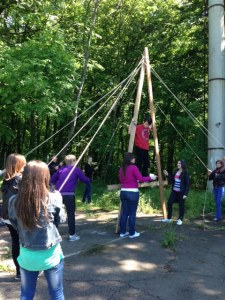
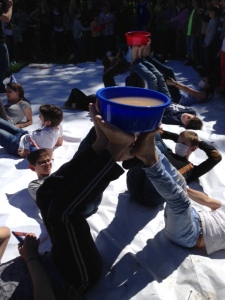
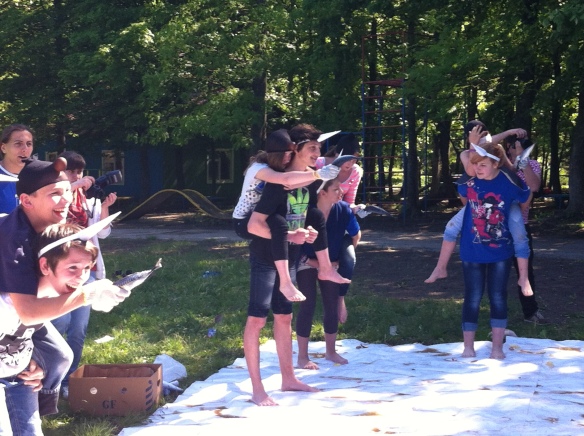

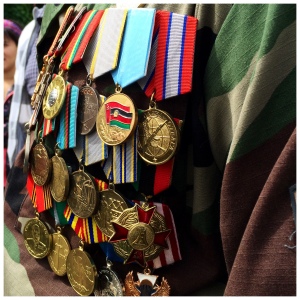
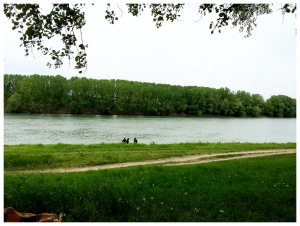 ANYWAY – the girls that we spent time with this afternoon were more than resilient. The word resilient does not do them, their stories, and their futures justice. They have experienced the darkest, most deplorable depths of humanity and are still able to smile, laugh, and joke around like any other teenage girl. This served as a reminder for me not to put survivors of trauma in a special, sugar coated, Nerf-like compartment in my mind. They deserve better from me – better from my time – better from my profession. They deserve to be treated like I would treat anyone else – like I would treat Jesus. I shouldn’t stand on the bank of a river in the midst of a volleyball game and pathologize their behaviors through an unnecessary filter as if I’m walking around on sterilized eggshells. These girls want to be loved with a real love – not some textbook, manual-driven relationship. They need these real relationships in order to mend and correct what was done to them by their perpetrators. (Clarification: while advocating for a real, get-your-hands-dirty-type love, I’m still 100% mindful of being sensitive of their trauma and not in any way trying to minimize it. I, personally, require a reminder to get my nose out of the clinical books and take my sterile white gloves off in order to love them the way they deserve and need.)
ANYWAY – the girls that we spent time with this afternoon were more than resilient. The word resilient does not do them, their stories, and their futures justice. They have experienced the darkest, most deplorable depths of humanity and are still able to smile, laugh, and joke around like any other teenage girl. This served as a reminder for me not to put survivors of trauma in a special, sugar coated, Nerf-like compartment in my mind. They deserve better from me – better from my time – better from my profession. They deserve to be treated like I would treat anyone else – like I would treat Jesus. I shouldn’t stand on the bank of a river in the midst of a volleyball game and pathologize their behaviors through an unnecessary filter as if I’m walking around on sterilized eggshells. These girls want to be loved with a real love – not some textbook, manual-driven relationship. They need these real relationships in order to mend and correct what was done to them by their perpetrators. (Clarification: while advocating for a real, get-your-hands-dirty-type love, I’m still 100% mindful of being sensitive of their trauma and not in any way trying to minimize it. I, personally, require a reminder to get my nose out of the clinical books and take my sterile white gloves off in order to love them the way they deserve and need.)